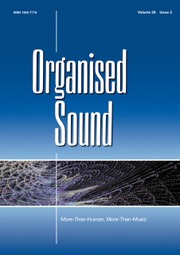Article contents
Imaginary Spaces: New Malaysian performance contexts for intercultural exploration
Published online by Cambridge University Press: 30 June 2014
Abstract
The Imaginary Space: Developing models for an emergent Malaysian/Western electroacoustic music is a Fundamental Research Grant Scheme project funded by the Malaysian government in which intercultural investigation is centred within an electroacoustic performance environment. A unique series of music outcomes and potential models reflecting a symbiosis of Malaysian and Western art music through composition and performance are emerging for instrument(s) and electronics. This paper focuses on the first and second phases of the project investigating Western flute, Malaysian serunai and pensol nose flute with electronics. Multi-stranded investigations of connections are identified within the conception, composition, realisation and reception of these works. Performer perspectives are given through two case studies. Our purpose is to illuminate understandings of intercultural connections, to begin to re-conceptualise cultural research paradigms, and to see what we can discover about performance contexts and engagement with individuals, cultures and traditions. The research is contextualised within the philosophical theories of Gadamer, Merleau-Ponty and Ingold. Investigating the role of technology in this context impels a discussion of how these elements generate a new, multifaceted environment, the space in which intercultural and performative understandings can emerge. This article focuses on how these performance contexts become a place for research and new understandings.
- Type
- Articles
- Information
- Copyright
- Copyright © Cambridge University Press 2014
References
- 1
- Cited by


